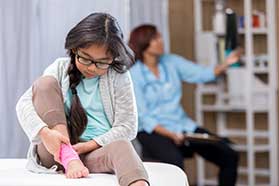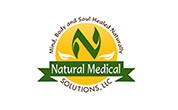Juvenile Arthritis Treatment in Atlanta, GA

Arthritic joints usually plague those in older age, stemming from years of wear and tear (osteoarthritis). But sometimes arthritis has an early onset. Arthritis affecting children aged 16 and younger is called juvenile arthritis. Juvenile arthritis, also called juvenile idiopathic arthritis (idiopathic meaning no known cause), is an autoimmune disorder in which the immune system mistakenly attacks the body, causing inflammation (swelling) of the synovium, the tissue that lines the inside of the joints.
To schedule a consultation with a qualified healthcare provider in Atlanta that specializes in juvenile arthritis treatment, call (770) 674-6311 or contact Natural Medical Solutions Wellness Center online.
Juvenile Arthritis Symptoms
Symptoms of juvenile arthritis may vary depending on the type of arthritis experienced (see below), with symptoms ranging from none at all to more severe juvenile arthritis symtpoms, including:
- Joint stiffness (especially in the morning), as well as joint swelling, pain or tenderness
- Limping
- Persistent fever
- Rash
- Weight loss
- Fatigue
- Irritability
- Eye redness or eye pain
- Blurred vision
Types of Juvenile Arthritis
There are a 5 known types of juvenile arthritis your child might develop. These are:
- Systemic arthritis, also called Still’s disease, refers to systemic arthritis that can involve the entire body, usually causing a high fever and rash on the trunk, arms and legs. The condition might also affect internal organs, such as the heart, liver, spleen and lymph nodes.
- Oligoarthritis, also called pauciarticular juvenile rheumatoid arthritis, refers to arthritis affecting fewer than five joints within the first six months that the child has the disease. Common joints include the knee, ankle and wrist. Oligoarthritis can also affect the eye, causing eye inflammation (uveitis) which affects the iris most frequently. This type of arthritis is typically outgrown by adulthood.
- Polyarthritis, also called polyarticular arthritis, involves five or more joints in the first six months of the disease, often the same joints on each side of the body. Joints of the jaw and neck might be affected as well as those in the hands and feet. More commonly affecting girls than boys, polyarthritis more closely resembles adult arthritis.
- Psoriatic arthritis refers to arthritis affecting children in conjunction with the skin disorder psoriasis . Children with this form of arthritis often have pitted fingernails.
- Enthesitis-related arthritis, often affecting the spine, hips, eyes and entheses (the places where tendons attach to bones), occurs in mainly boys older than 8 years old, while a family history of ankylosing spondylitis (arthritis of the back) is common in affected children.
Juvenile Arthritis Diagnosis
There is no single test to detect juvenile arthritis, as symptoms may present widely and be associated with other diseases. Your healthcare provider will likely take a complete medical history and perform a physical exam. Additional diagnostic tests might include:
- Complete blood count (white cells, red cells and platelets)
- Lab tests on urine or blood
- X-rays (to rule out broken or damaged bones)
- Imaging tests such as MRIs
- Blood culture to inspect for bacteria, which could indicate an infection in the bloodstream
- Tests for viruses
- Tests for Lyme disease
- Bone marrow exam, which detects leukemia
- Erythrocyte sedimentation rate to detect how quickly red blood cells fall to the bottom of a test tube (a faster rate could indicate a disease which causes inflammation)
- Test for rheumatoid factor, an antibody found in people with arthritis
- Antinuclear antibody test to reveal evidence of autoimmune diseases, which cause the body’s immune response to malfunction and mistakenly attack the body itself which it detects as threatening
- Bone scan to detect changes in bones and joints
- Joint fluid sampling and synovial tissue sampling
Juvenile Arthritis Treatment
Depending on the type of juvenile arthritis your child has, treatment could vary, though general treatment options aim to relieve pain, reduce inflammation, increase joint mobility and strength, and to prevent joint damage and associated complications, all while improving your child's quality of life.
Nonsurgical treatment options for juvenile arthritis may vary widely but will involve a combination of medication, physical activity and healthy eating. Your child's treatment plan could include:
- Nonsteroidal anti-inflammatory drugs (NSAIDs) such as ibuprofen or naproxen which can reduce inflammation and relieve pain
- Disease-modifying anti-rheumatic drugs (if NSAIDs prove unsuccessful) which can slow or stop the progression of juvenile arthritis
- Biologic agents may be recommended if disease-modifying anti-rheumatic drugs prove unsuccessful and the patient has arthritis of the sacroiliac joint; these may slow or stop the progression of the disease
- Corticosteroids, for more severe cases of juvenile arthritis cases, can help reduce serious symptoms (such as inflammation of the sac around the heart)
- Exercise therapy, which can help maintain muscle tone, as well as preserve and recover joint range of motion and function
Surgery is typically not needed for juvenile arthritis except in severe cases--for instance, when complications of juvenile arthritis cause joint deformity. Surgery can be discussed with your healthcare provider if he or she thinks your child could benefit from it. Certain lifestyle modifications may be necessary for children with juvenile arthritis, such as developing strategies to assist in clothing themselves (such as wearing clothes with Velcro or zippers) which do not worsen their symptoms. Toothbrushes with larger, softer grips are available if the act of tooth-brushing proves difficult or painful. An occupational therapist can help you develop strategies that work for you child.
It is important to meet with a healthcare provider if you suspect your child has juvenile arthritis to ensure treatment is most effective. Schedule a consultation with a qualified healthcare provider in Atlanta that specializes in juvenile arthritis treatment. Call (770) 674-6311 or contact Natural Medical Solutions Wellness Center online.
Natural Medical Solutions Wellness Center
Address
1130 Upper Hembree Rd.Roswell, GA 30076
(770) 674-6311
www.natmedsol.com
Hours
Mon:
9:00 am - 4:00 pm
Tue:
9:00 am - 4:00 pm
Wed:
9:00 am - 4:00 pm
Thu:
10:00 am - 6:00 pm
Fri:
9:00 am - 2:00 pm
Sat:
9:00 am - 2:00 pm

